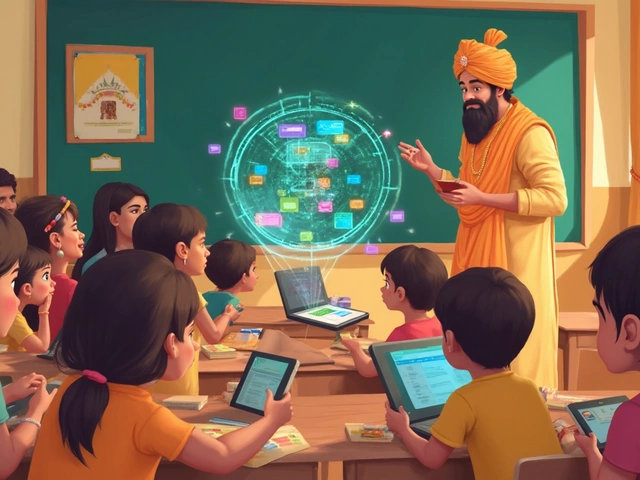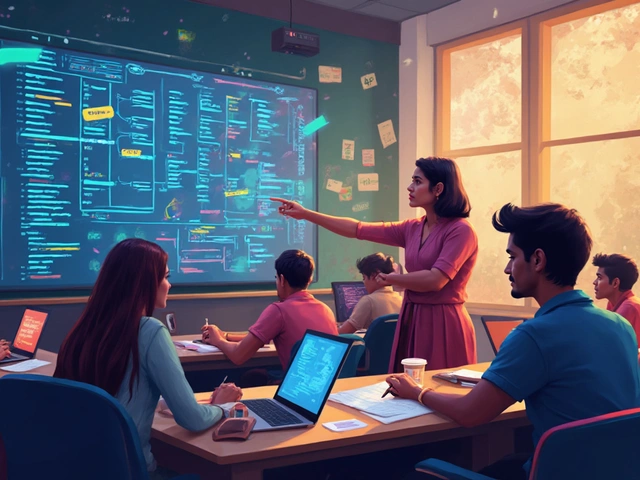So you're thinking about diving into the world of coding, but there's one thing that's holding you back: math. You're not alone if you think you need to be some kind of math genius to write a line of code. But here's the kicker—most coding doesn’t require more math than basic arithmetic. Surprised? Let's break it down a bit.
It's true that certain programming areas like data science or game development can dip heavily into math territory. But the majority of coding involves problem-solving, creativity, and logic more than traditional math skills. Think of it like solving a puzzle or a Sudoku. You're looking at patterns, troubleshooting, and thinking critically.
Now, don't get me wrong, having math skills can be helpful especially when you're dealing with algorithms or data analytics. But you don't need to start fretting over calculus just to build a simple web application or automate a task. Programming languages like Python, JavaScript, or even HTML and CSS, focus more on logic and syntax.
- Coding and Math: A Common Misconception
- Logic Over Numbers
- Real-Life Skills in Coding
- Tips for Non-Math Coders
- Debunking Math Myths
- Starting From Scratch: Resources and Tools
Coding and Math: A Common Misconception
There’s this long-standing myth that you need to be a number whiz to excel in coding. It's one of those things people say enough times, and suddenly everyone believes it. But let's clear this up: coding is more about logic and problem-solving than cracking complex math formulas.
Sure, certain fields like machine learning or graphics programming might involve more complex math, but if you're looking to develop websites, mobile apps, or basic software, then math skills are more of a 'nice-to-have'. For many languages—let's say JavaScript or Python—the focus is more on understanding how to use the tools rather than on math itself.
The Heart of Coding: Logic Over Numbers
The most important skill in programming is logical thinking. You could think of it as giving orders to a very literal-minded robot. Your understanding of logic will guide you in writing instructions that are both clear and efficient. Unlike math, coding doesn’t usually require solutions that involve higher-level equations.
- Logical structures like loops and conditions are at the core of coding.
- Concepts such as
Logic Over Numbers
You might have heard people say that coding is all about math, but let me tell you, it's more about logic and problem-solving. It's like when you're playing a strategy game—you're not crunching numbers but thinking several steps ahead.
One of the first things new coders realize is how much coding involves breaking down big problems into smaller, manageable pieces. That's logic at work. As you code, you're essentially teaching the computer to follow a set of logical instructions to achieve a specific goal.
"Programming is about creating logic and structure to solve new problems, not merely applying mathematical principles," says Paul Krutchen from the Software Architecture Reference Guide.
Let's take an example. Creating an online shopping cart doesn't mean you need to have advanced math skills. What you need is to know the logical steps, like adding items, updating quantities, and processing payments.
Learning to Think Like a Coder
Coding is a mind game that trains you to think logically and solve puzzles. Here are a few ways to tighten up those logic skills:
- Practice Coding Challenges: Websites like Codewars or LeetCode help you practice coding logic regularly.
- Play Puzzle Games: Engage in games like Sudoku or logic puzzles that can sharpen your problem-solving skills.
- Work on Projects: Start small; recreate an app or game you're interested in and focus on the logical side, not just the code lines.
After all, it's not about memorizing formulas but learning a new way to think. And remember, even seasoned coders sometimes lean more on logic than numbers.
Real-Life Skills in Coding
When we talk about coding, it's not all about numbers and formulas; there's a whole bunch of real-life skills that you bring to the table. These skills often make a massive difference in your programming journey, even more than hardcore math knowledge.
Problem-Solving
One of the main things you do in coding is solve problems. It's like being a detective, but without the cool magnifying glass. You need to analyze what might be going wrong and figure out how to fix it. Coding languages often put you in situations where you must troubleshoot errors and think creatively.
Attention to Detail
It's all about the details. A single missing semicolon can break everything! Being detail-oriented is crucial in coding, even if you're using languages that are more forgiving. So if you're good at noticing the little things in life, you'll probably do well here.
Communication Skills
Don't think of coding as an isolated activity. In reality, you’ll communicate with your team to create and debug projects. Whether it's explaining your part of a project or writing clear documentation, good communication can set you apart.
Creativity
Believe it or not, creativity is a big asset in programming. You might be building something from scratch or developing a new feature to improve user experience. Trust your creative instincts to find unique solutions to problems.
Tech Adaptability
Tech is always changing, and coders need to adapt quickly. Whether it’s learning a new language or understanding the latest software update, a willingness to keep up with trends and changes is key.
Here's a fun fact: in a survey of developers, around 65% said adapting to new tech trends helped them advance their careers. Being adaptable opens up more opportunities in industries that heavily rely on technology.

Tips for Non-Math Coders
If you're worried about your math skills holding you back from becoming a coder, fear not. Plenty of coding whizzes started out just where you are. Here are some concrete tips for you to thrive in coding without being a math genius.
1. Focus on Logic and Problem Solving
Coding is more about logic than crushing numbers. Work on honing your problem-solving skills by practicing logic puzzles or using coding challenges on sites like Codewars or LeetCode. These platforms emphasize logic rather than pure math.
2. Break Down Problems
Learn to tackle big coding problems by breaking them into smaller, manageable pieces. Think about coding like building blocks; once you stack small solutions together, you create a robust program.
3. Use Resources Specifically Tailored for Beginners
Tons of resources cater to newbies who might not have a deep math background. Websites like Codecademy or Udemy offer courses that focus on building coding skills from the ground up without assuming any math prowess.
4. Embrace the Power of Community
Don't go through this journey alone. Engage with online communities like Stack Overflow or Reddit's programming threads. Chances are, someone else has the same questions and the solution you need was already discovered by someone else.
5. Leverage Visual Tools
Some people learn better visually. Tools like Scratch or Blockly allow you to understand programming concepts through visual interactions. Once you get those basics down, transitioning to text-based coding becomes a smoother ride.
6. Don't Be Afraid to Use Libraries
Smart coders use libraries and frameworks to accomplish tasks that may involve complex math. When you're programming, it's perfectly okay to rely on these tools to simplify complex operations—like using a library for graphical computations in games.
Bonus Tip: Track Your Progress
Week Hours Coded 1 5 2 10 3 15 Keeping track of something as simple as hours spent coding can be a great motivator, showing you just how far you've come. The above table is a simple way to see your dedication and progress at a glance. Remember, every hour adds up.
So there you have it, some doable ways to get into coding without stressing over math. Start with small steps, stay consistent, and soon you'll find that coding becomes second nature.
Debunking Math Myths
When it comes to coding, there's this huge myth floating around that you need top-notch math skills to succeed. Let’s unravel this myth and talk about what really matters in programming.
Myth: Coding is Just Like Math Exams
Many folks think coding is about churning through complex equations or endless spreadsheet calculations. Actually, coding is more about understanding instructions and solving problems step by step. You're usually dealing with logic, structure, and sometimes flavoring your code with a dash of creativity. It's less about sweating over a math exam and more about piecing together a puzzle.
Myth: You Can't Code Without Advanced Math
In reality, several areas of coding require little to no math. Building websites with HTML and CSS, for example, will have you styling and structuring content rather than dealing with numbers. Even when math comes in, it's often simple arithmetic.
- Web development - Focuses on design, user experience, and responsiveness.
- Software engineering - Coding logic, workflows, and debugging take the front seat.
- Mobile app development - Requires intuitive interfaces and seamless integration.
Interesting Fact: Math in 'Coding' Jobs
While you might think math is critical in every tech job, a 2022 survey showed that only about 40% of developers said advanced math was necessary for their roles. Instead, they pointed to problem-solving and logical thinking as key skills. Charts and statistics might be rare, but planning a user journey or constructing code architecture is everyday stuff.
So, can you dive into coding if you're bad at math? Absolutely! Much of coding rests on practice, learning from mistakes, and perseverance. Unlike math, where precision is key, coding often gives you the freedom to try new things and to learn as you go. The bottom line? Don't let math phobia keep you from pursuing your coding dreams. Embrace logic, get creative, and start building. The coding world is vast and offers room for all kinds of skills.
Starting From Scratch: Resources and Tools
Alright, so you've decided to jump into the coding world. But where do you start, especially if your math skills aren't the sharpest? Don't sweat it—there's a bunch of great resources and tools out there to kickstart your coding journey, no calculus required.
Free and Paid Online Courses
The internet is your best friend when it comes to learning something new. Websites like Codecademy offer interactive courses that are great for beginners. Not to mention, platforms like Udemy or Coursera have courses that range from beginner to advanced, catering to different programming languages and specializations.
Coding Bootcamps
If you want something more intensive, coding bootcamps are another route. General Assembly and Le Wagon have immersive programs that teach you how to code in a few months. It's more like diving headfirst rather than dipping your toes, but a really effective way for career switchers.
Hands-On Practice with Coding Platforms
Sites like LeetCode or HackerRank let you practice coding problems to sharpen your skills. And don't just look at solutions—try writing your own and get that hands-on experience.
The Power of Community
A huge advantage of learning coding today is the massive community out there. Stack Overflow is a go-to place for getting your questions answered. Joining forums or social media groups can also be super helpful for networking and finding motivation. It's like having a group of friends who get what you're struggling with.
Utilizing Text and Video Tutorials
Sometimes, a good old-fashioned tutorial is all you need. YouTube is packed with free video walkthroughs on pretty much any coding topic. Channels like Traversy Media and freeCodeCamp offer quality content. It's a fantastic way to learn by seeing someone else code in real-time.
Keeping it Engaging
Remember, the point is to enjoy the process. Build projects that interest you or solve problems you personally encounter. It's all about making coding fun and less about getting the math right.










0 Comments